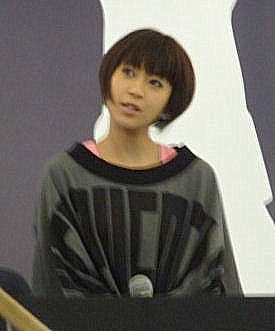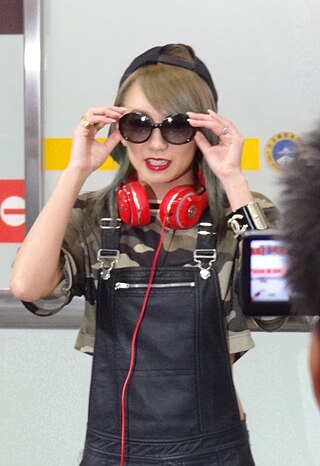
Memorial Address is the debut mini-album by Japanese singer Ayumi Hamasaki. Avex Trax released the album on December 17, 2003, in both physical and digital formats; it was her first album to be released in CD+DVD format in addition to the regular CD-only format, due to her increased interest in music video direction. The mini-album contains eight songs and features a number of collaborators, including Tetsuya Yukumi, Bounceback, CMJK, and Dai Nagao, among others, with Hamasaki serving as co-composer and songwriter. Memorial Address's musical influences include dance music, electronic, R&B, rock, and alternative metal.

& is an extended play by Japanese recording artist and songwriter Ayumi Hamasaki. It was released on July 9, 2003, by record label Avex Trax. Hamasaki's fourth extended play, & consists of four recordings; "Ourselves", "Greatful Days", "Hanabi: Episode II", and "Theme of A-Nation 03", with three additional instrumentals of the first three tracks. It was released in two different formats; a stand-alone CD, and a digital EP. The artwork for the EP depicts Hamasaki posing in front of a cloudy backdrop, with the title of the work superimposed over her hair. & contains predominantly J-pop and dance music.

(Miss)understood is the seventh studio album by Japanese singer-songwriter Ayumi Hamasaki. It was released on New Year's Day 2006, by Avex Trax. Hamasaki acted as the album's sole lyricist, as she had on all of her preceding albums. (Miss)understood marked new musical directions for Hamasaki: she explored new influences such as funk and used gospel choruses in some of the songs, foreign to her previous works. This was the result of her having heard compositions by Geo from the German-based pop music project Sweetbox and asking him for his works. Subsequently, Hamasaki rewrote the lyrics entirely to fit (Miss)understood. Lyrically, the album was a departure from her previous work, My Story, which had been primarily autobiographical.

Japanese singer Ayumi Hamasaki has released eighteen studio albums, five compilation albums, twenty-six remix albums, four live albums and numerous singles and promotional singles. She debuted in 1995 under Nippon Columbia with the stage name Ayumi, releasing an extended play Nothing from Nothing, which was a collaboration with Dohzi-T and DJ Bass. Three years later, Hamasaki debuted again as a singer under Avex Trax with the single "Poker Face" (1998). Her first album A Song for ×× (1999) debuted at number one on Oricon's albums chart, and sold over 1.4 million copies.

The discography of Japanese-American R&B and pop singer Hikaru Utada consists of eleven studio albums, four compilation albums, eleven video albums and numerous singles and promotional singles. Utada began as a musician in the early 1990s as a member of U3, a family unit made up of her, her mother Junko Utada, also known as 1970s enka singer Keiko Fuji, and her father, musical producer Teruzane Utada. U3 released their debut album Star in 1993, with the hope to debut in America. In 1996, the group was rebranded as Cubic U, an R&B project focusing on Hikaru Utada, resulting in the English language album Precious in 1998 with record label Toshiba EMI.

The discography of Japanese pop singer Koda Kumi includes 18 studio albums, 2 cover albums, 10 compilation albums, 10 remix albums, 9 live albums and 57 singles. All of her Japanese musical releases have been with Rhythm Zone, a sub-label of Avex Group.

The discography of Japanese recording artist Namie Amuro contains 12 studio albums, 7 compilation albums, 47 singles, 10 live albums, 14 video albums and 102 music videos. Amuro has also collaborated with Verbal of M-Flo and Ryōsuke Imai for her Suite Chic project.

The discography of Japanese R&B singer Misia consists of nine studio albums, three compilation albums, one extended play (EP), one live album, six remix albums, twenty-six singles, twelve promotional singles, eighteen video albums and thirty-seven music videos. In 1997, Misia signed a recording contract with BMG Japan and joined the then up-and-coming talent agency, Rhythmedia. Under the sub-label Arista Japan, Misia released her first single, "Tsutsumikomu Yō ni..." in February 1998, followed by "Hi no Ataru Basho" in May. In June, her debut album, Mother Father Brother Sister, opened at number three on the Oricon chart. The album peaked at number one three weeks later and stayed in the top five for eleven consecutive weeks. Mother Father Brother Sister was certified double million and won a Japan Record Award for Best Album, as well as a Japan Gold Disc Award for Pop Album of the Year. In 2000, Misia's second studio album, Love Is the Message, debuted at number one and was certified double million. It won a Japan Record Award for Best Album and a Japan Gold Disc Award for Pop Album of the Year. The album spawned three top ten hits: "Believe," "Wasurenai Hibi" and "Sweetness." Misia's first remix album, Misia Remix 2000 Little Tokyo, was released three months later and shot to number one. It sold over 800,000 copies and is the second best-selling remix album of all time in Japan.
Tegomass was a Japanese duo consisting of NEWS members Yuya Tegoshi and Takahisa Masuda, formed to promote Johnny's Entertainment internationally. The group's name is a merging of Tegoshi's and Masuda's names.

The discography of Mika Nakashima includes 11 studio albums, 7 compilation albums, 45 singles and 20 video albums. These have all been released through Sony Music Entertainment Japan.
The solo discography of Japanese musician Yui consists of five studio albums, three compilation albums, twenty-one singles and five video albums. These were released on independent label Leaflet Records in 2004, followed by Sony Music Entertainment Japan sub-label Gr8! Records in 2005, Sony Records between 2005 and 2006, Sony sub-label Studioseven Recordings between 2007 and 2010, before returning to Gr8! Records in 2010.
The discography of Japanese singer Mai Kuraki consists of fifteen studio albums, six compilation albums, twenty-three video albums, three remix albums, fifty-six singles, and sixteen promotional singles. Kuraki debuted in 1999, while she was still in high school, through Giza Studio. The label initially marketed Kuraki in the United States under the name Mai K, and released the single "Baby I Like" (1999). However, the single was a commercial failure which prompted the label to send her back to Japan. There, they released her single "Love, Day After Tomorrow", which peaked at number two on the Oricon Singles Chart and was certified million by the Recording Industry Association of Japan (RIAJ). The second single, "Stay by My Side" became her first number one single on the chart. Kuraki's debut album, Delicious Way, topped the Oricon Albums Chart and was certified triple million by the RIAJ.
The discography of Ayaka consists of six studio albums, two compilation albums, a cover album and numerous singles, released through Warner between 2006 and 2009, and through Ayaka's independent label, A Station, from 2012 onwards.
The discography of Japanese R&B and pop singer Ken Hirai consists of ten studio albums, two compilation albums, one remix album, three cover albums, thirteen video albums and numerous singles and promotional singles. Hirai debuted as a musician under Sony Music Records in 1995 with the single "Precious Junk", but found success five years later with the single "Lakuen" and his third album, The Changing Same.
The discography of Japanese group KinKi Kids consists of 17 studio albums, 6 compilation albums, 25 video albums and 44 singles. All of KinKi Kids' singles have reached number one in Japan on Oricon charts. All of their music has been released by Johnny's Entertainment in Japan. In Taiwan, Kinki Kids' music has been released under Forward Music from 1997 to 2000, Skyhigh Entertainment and What's Music in 2001, and Avex Taiwan from 2002 to the present.

The discography of Japanese musician Kaela Kimura consists of eleven studio albums, two compilation albums, one cover album, four extended plays, thirty-one singles and five video albums. She debuted as a musician in 2004 under the label Columbia Music Entertainment, releasing ten albums with the company. In 2013, Kimura released Rock, an album of English language covers under her private label Ela Music. In 2014, Kimura released "Ole! Oh!", her first single under Victor Entertainment.

The discography of Japanese recording artist and actor Masaharu Fukuyama consists of ten studio albums, four compilation albums, three remix albums, twenty video albums, and numerous physical and promotional singles. Fukuyama debuted through BMG Japan by releasing the single "Tsuioku no Ame no Naka" (1990) and the album Dengon. The works failed to chart, however, in 1992 the single "Good Night", aided by the popularity it gained through use in the drama Ai wa Dō da, charted on the Oricon Singles Chart, peaking at number nine. In 1993, his album Calling became his first number one album on the Oricon Albums Chart; it has sold over 850,000 copies in Japan and has been certified two-times platinum by the Recording Industry Association of Japan (RIAJ).

Love is the third mini-album by Japanese recording artist Ayumi Hamasaki. It was released on 8 November 2012 in three editions: CD+DVD, CD-Only and a limited Tales of Xillia 2 Edition.

The discography of M-Flo features nine studio albums, nine compilation albums, one live album and 25 singles. These were released on Labsoul Records and Avex Group independent label Rhythm Republic in 1998, and from 1999 onwards released through Rhythm Zone.

The discography of the Japanese pop group Sandaime J Soul Brothers consists of ten studio albums, two compilation albums, and twenty-six singles. Since the group's original formation in 1999, the group has experienced two line-up changes and reboots, and currently consists of seven members: Naoto Kataoka, Naoki Kobayashi, Ryuji Imaichi, Hiroomi Tosaka, Elly, Takanori Iwata, Kenjiro Yamashita. The group was formed by producer and former Exile member Hiroyuki Igarashi who founded the group's management agency LDH Japan.













